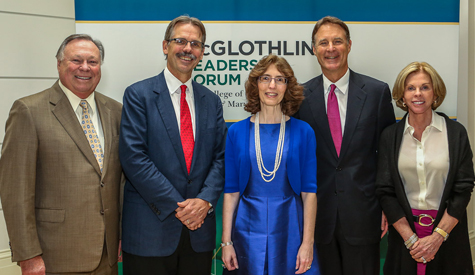McGlothlin Leadership Fellows Discuss Solutions to Country's Challenges
Nine days into a government shutdown and one week away from a U.S. debt default, the McGlothlin Leadership Forum Fellows recently took center stage to discuss and debate the pressing economic, political and legal issues facing the country.
Held on Oct. 9, the third annual McGlothlin Leadership Forum plenary session featured fellows Evan Bayh, a partner at McGuireWoods and a former two-term Indiana governor and U.S. senator; Glenn H. Hutchins, co-founder of Silver Lake, one of the world's largest firms investing in technology and technology-enabled businesses, and vice chairman of the Brookings Institution; and Linda A. Klein, managing shareholder at Baker Donelson and the first woman to serve as president of the Georgia Bar Association. James McGlothlin ’62, J.D. ’64, LL.D. ’00, for whom the event is named, moderated the event.
{{youtube:medium:left|whCN27c38jc, Video: 2013 Plenary Session}}
During the discussion, the fellows explored current issues such as the polarization and political gridlock in Washington, debt ceiling deadline, tort reform, healthcare reform, and corporate tax system.
"By far the biggest issue in this budget fight is healthcare," said Hutchins, who served as a special advisor on economic and healthcare policies during the Clinton administration. "But until we can find a way to have everybody covered under insurance, we won't be able to get the costs under control," he added.
Klein, who served as chair of the American Bar Association's House of Delegates during the 2011-12 term, addressed the changes occurring in the legal profession and the "loser pays" system - where the loser pays the winner's legal fees - which has been adopted by a handful of states. "The legal profession is undergoing lots of disruptions," said Klein. "How people are paying for their legal services and the use of technology are changing how we operate."
Klein admitted that she was still on the fence about whether the loser-pays system would improve the American legal landscape. The idea that it will deter frivolous litigation and solve the problem of excessive lawsuits was appealing, but the potential consequences of limiting public access to justice concerned her. "Everyone has a right to access justice," said Klein, citing the opening of the U.S. Constitution.
Bayh had coinciding views with Hutchins on how to right America's economic system. "We need to get our long-term house in order to service our debt," said Bayh. "These problems are not easy to solve, but I think we will eventually get there."
McGlothlin closed the session by asking the fellows which industries will likely experience the largest growth. They unanimously agreed the energy sector had the most potential.
"These fellows are the highest caliber leaders in business, law, and politics," McGlothlin told the audience. "We are fortunate to have them here to inspire William & Mary students to examine these issues as they prepare to make a difference in the world."
The forum is co-sponsored by the William & Mary Mason School of Business and William & Mary Law School, and is supported by James and Fran McGlothlin.
About William & Mary Law School
Thomas Jefferson founded William & Mary Law School in 1779 to train leaders for the new nation. Now in its third century, America's oldest law school continues its historic mission of educating citizen lawyers who are prepared both to lead and to serve.
